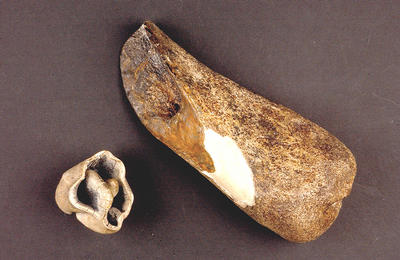
This milk tooth (left) from a young adult woolly rhinoceros was found in January 1931 at Cadder Quarry just outside Glasgow, 16 feet below the surface. The leg bone was found in August 1932, 18 feet below the surface, and is from an adult woolly rhinoceros. Both specimens were from the quarry's Crofthead Pit, which was being worked for sand and gravel extraction. An exact date cannot be assigned to these remains, but the animals must have lived in the Glasgow area during one of the inter-glacial periods that occurred in the last Ice Age. During inter-glacials the weather got warmer and the ice retreated, allowing animals such as woolly rhinoceros to live in Scotland. The remains of another woolly rhinoceros found at Bishopbriggs have been dated to 27,550 BP (around 25,000 BC).
Several species of rhinoceros existed in Europe during the Ice Age. Woolly rhinoceroses get their name from the thick layer of dense fur which kept them warm. They were found from Britain through Europe to Siberia but became extinct at the end of the Ice Age.
Reference: G.1966.29.a / G.1966.29.b
Reproduced with the permission of Glasgow City Council, Glasgow Museums
Keywords:
bones, Cadder Quarry, Crofthead Pit, geology, Ice Age, interglacials, quarries, teeth, woolly rhinoceroses, wooly rhinoceri
You have 0 images in your photo album.